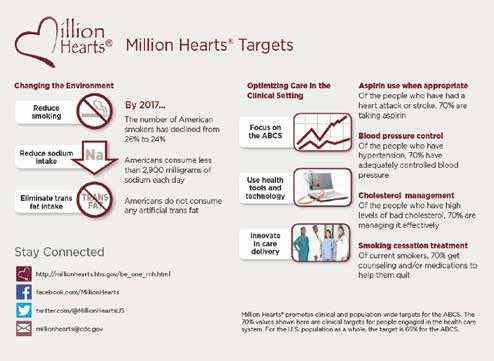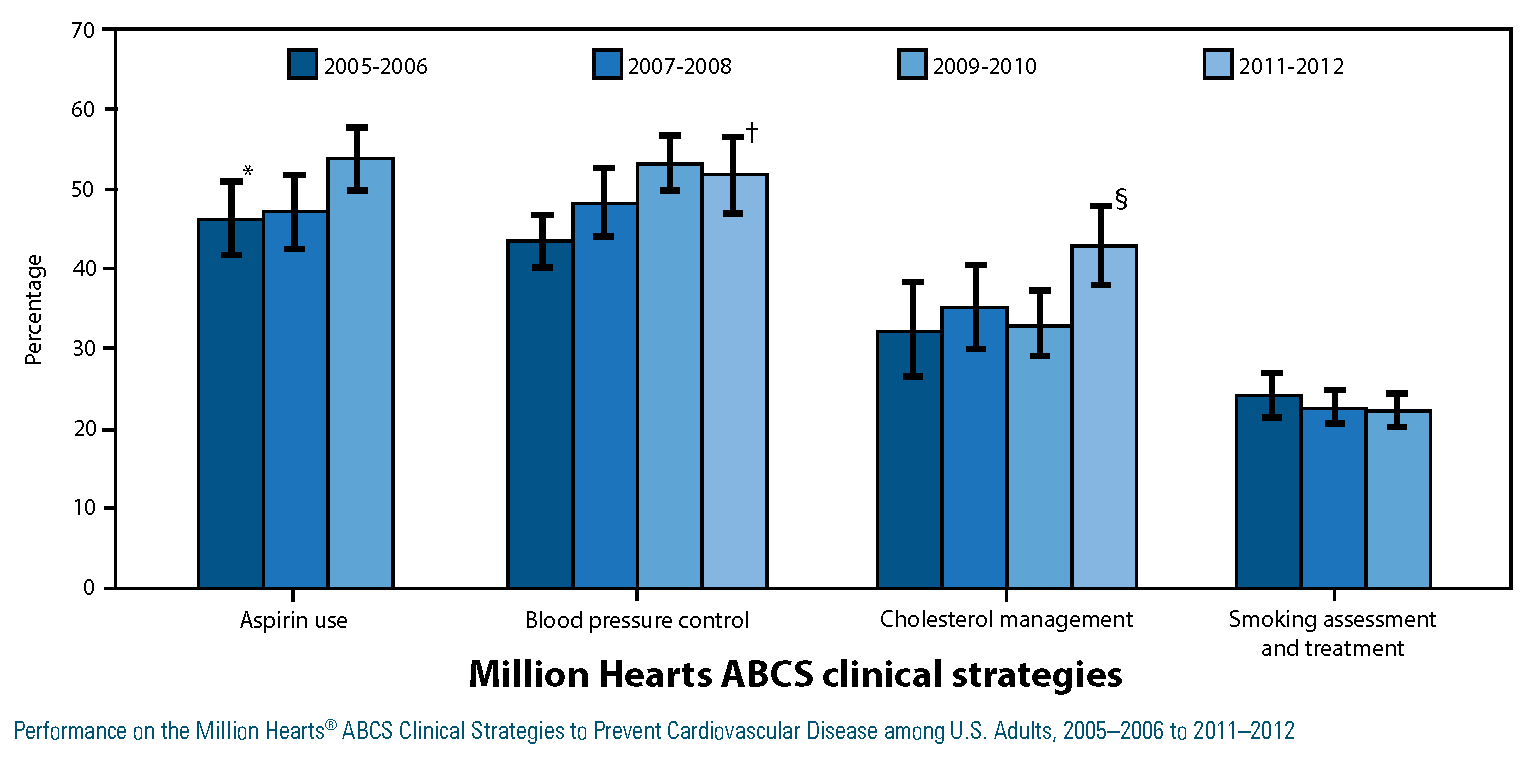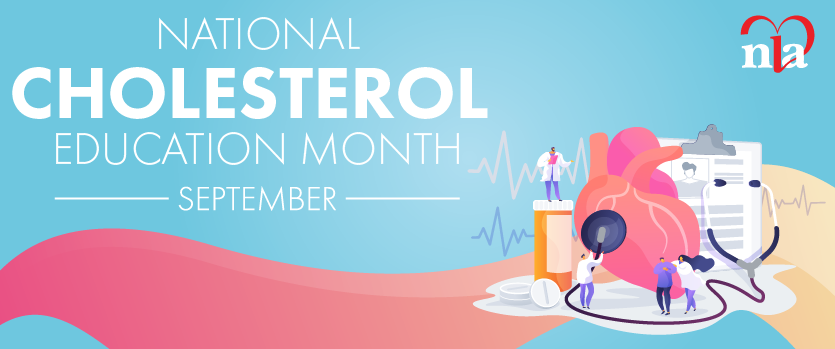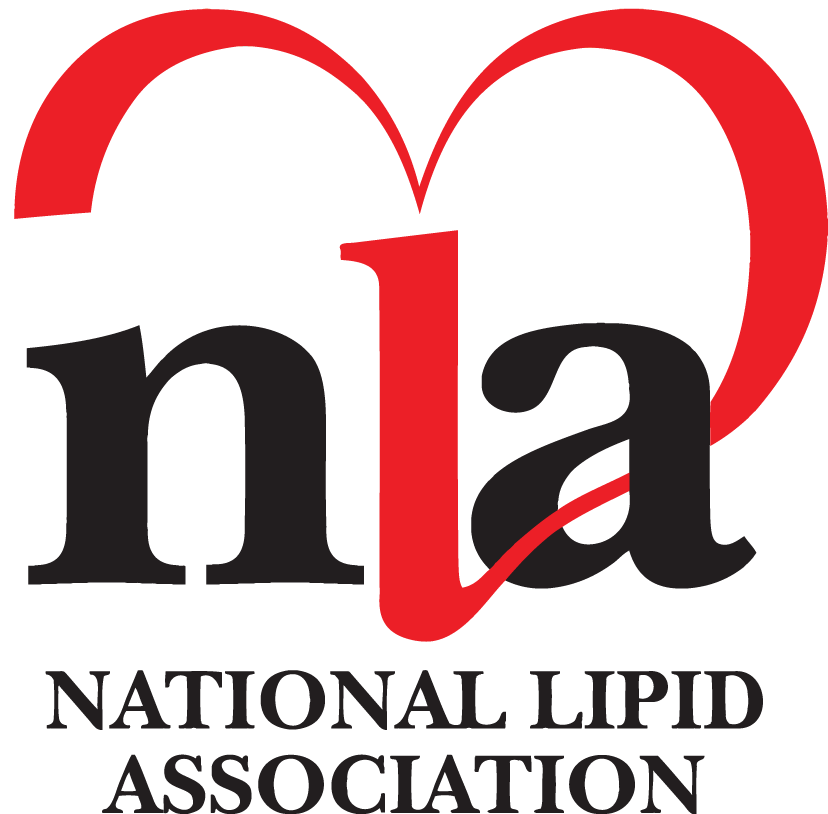Every 39 seconds, a U.S. adult dies from cardiovascular disease (CVD),1 the nation’s top killer and a leading cause of disability for Americans both young and old. We spend about 1 out of 6 healthcare dollars on this disease each year — an estimated nearly $320 billion in healthcare expenses and lost productivity.1 But those human and economic costs could be lower if we expanded our national actions in prevention.
About half of U.S. adults (46.5 percent) have at least one of three major — and preventable — risks for cardiovascular disease: uncontrolled high blood pressure, uncontrolled low-density lipoprotein cholesterol (LDL-C), or current tobacco use.2 Only around half (53.8 percent) of people who are at risk for CVD use aspirin; blood pressure is controlled in only about half of those with hypertension;3 and only one-third of American adults with a history of high cholesterol have optimal levels.4 Common and largely controllable risk factors, hundreds of thousands of preventable events, and under- performance on measures that matter: That’s why Million Hearts® was launched in late 2011.
Million Hearts® is a national public-private initiative with the goal of preventing 1 million heart attacks and strokes by 2017. The initiative brings together communities, healthcare professionals, health systems, nonprofit organizations, federal agencies, and private-sector partners to implement proven interventions in clinical settings and communities and to empower Americans to make healthier choices.
Connecting Public Health and Clinical Care
Reaching the Million Hearts® goal will take focused action by both public health and healthcare professionals. The most powerful public health interventions for preventing cardiovascular events in a five-year time frame are those intended to reduce smoking prevalence, lower daily sodium intake, and eliminate artificial trans-fat from the food supply. These actions can impact millions of people, resulting in a healthier population — and thousands fewer cardiovascular events. Healthcare professionals can have the greatest impact on heart attack and stroke rates by helping their patients achieve excellence in the ABCS:
- Aspirin when appropriate
- Blood pressure control
- Cholesterol management
- Smoking cessation
Achieving high performance on the ABCS will prevent more deaths from cardiovascular disease than will other clinical preventive services,5 and recent data show much room for improvement.6
 The “C” in the ABCS
The “C” in the ABCS
As experts in the field of lipids, you know that high cholesterol can be well managed for most patients through a combination of effective medications and good habits.7
Data from the National Health and Nutrition Examination Survey (NHANES) show signs of progress with the then-current cholesterol management increasing from 33.0 percent in 2009–2010 to 42.8 percent in 2011–2012.8 But opportunities to improve abound, especially among subsets of our population. A recent analysis of 2005–2012 NHANES data4 shows that about 78 million (36.7 percent) U.S. adults were on or eligible for cholesterol treatment based on the 2013 ACC/AHA guidelines.9 A little more than half (55.5 percent) were on cholesterol-lowering medication and 46.6 percent were modifying their lifestyle with exercise, diet, and/or weight control; more than one third (35.5 percent) were doing neither. These population-level data also shed light on troubling U.S. disparities. A lower proportion of eligible men than women were taking medication (52.9 vs 58.6 percent, p=0.01), as were a lower proportion of non-Hispanic blacks (46.0 percent) and Mexican Americans (47.1 percent) than non-Hispanic whites (58.0 percent, p<0.001), highlighting the need to systematically find and address these treatment gaps.
Partnerships and Focused Actions: Keys to Success
Getting to excellence in the ABCS will take teams, technology, and new workflows — and a strong bridge between clinical and community settings. In an effort to communicate the core tenets of these efforts, “Detect. Connect. Control.” has become a mantra in Million Hearts, applying to communities and clinics for hypertension control and other issues including cholesterol control. Those at high risk for CVD can be found in community settings and also “hiding in plain sight” within practices and systems across the country. For example, we know that three-quarters of the 35 million adults with uncontrolled hypertension saw their usual source of care at least twice in the previous 12 months.10 Algorithms can be designed to sift through electronic health record (EHR) data and find those patients with uncontrolled or not-yet-diagnosed hypertension.7 Those discovered are then connected to healthcare experts and community resources to help achieve safe control.
With the challenge of helping millions of Americans better manage their cholesterol to reduce cardiovascular risk, Million Hearts depends on organizations and individuals across the country. In addition to the National Lipid Association, Million Hearts® partners include numerous public and private sector organizations, such as the Association of State and Territorial Health Officials, National Committee for Quality Assurance, Association of Black Cardiologists, Kaiser Permanente, Men’s Health Network, Preventive Cardiovascular Nurses Association, American Heart Association, National Forum for Heart Disease and Stroke Prevention, Women’s Heart Alliance, and others. All are focused on implementing what works to avoid preventable events and contribute to cardiovascular health.
Million Hearts® partners are innovating to make our vision a reality. For example, the American Pharmacists Association Foundation’s Asheville Project created a community-based medication therapy management program for high blood pressure, cholesterol, and triglycerides to benefit 12,000 employees of the city and a local hospital system. Participants received employer-sponsored counseling and classes with clinically trained educators and pharmacists. Employers also reduced or eliminated medication co-payments. Over a period of 6 years, the proportion of people who achieved cholesterol targets rose from 50 to 75 percent. Healthcare costs paid by the employer fell by nearly half, and the percentage of health plan costs related to cardiovascular disease dropped substantially, from 30.6 to 19.1 percent.
The Kaiser Permanente Colorado High Blood Pressure and Cholesterol Management Program established patient registries and outreach lists to manage the care of patients with high blood pressure and cholesterol in the company’s health insurance system. The risk of a cardiac-related death decreased by 88 percent among Colorado residents who enrolled within 90 days of a heart attack, compared with patients who did not enroll in the program. Through the program, the percentage of patients screened for cholesterol rose from 55 to 97 percent, and the percentage of patients who met target cholesterol readings increased from 26 to 73 percent.

2016 and Beyond
In this next year, Million Hearts® will draw an even greater focus on “Detect. Connect. Control.” We will be working with partners to find more people at risk and to match up those individuals with the experts and resources that can help them live healthier, event-free lives. As communities focus on healthy-habit supports for exercise and nutrition, clinical practices and systems can contribute through widespread implementation of standardized treatment protocols, EHR-facilitated registries and algorithms, and proactive, team-based care. As a result, more people can write a new and healthy family history. If you already are one of the many Million Hearts® supporters, thank you. If you’re just learning about the initiative now, we hope you will join us and take action. Together, we can make a difference for one person, one family, one community, one state — and reach 2017 with more than 1 million healthier hearts.
Disclosure statement: Dr. Wright has no disclosures to report.
References are listed on page 35.






.jpg)
.png)











